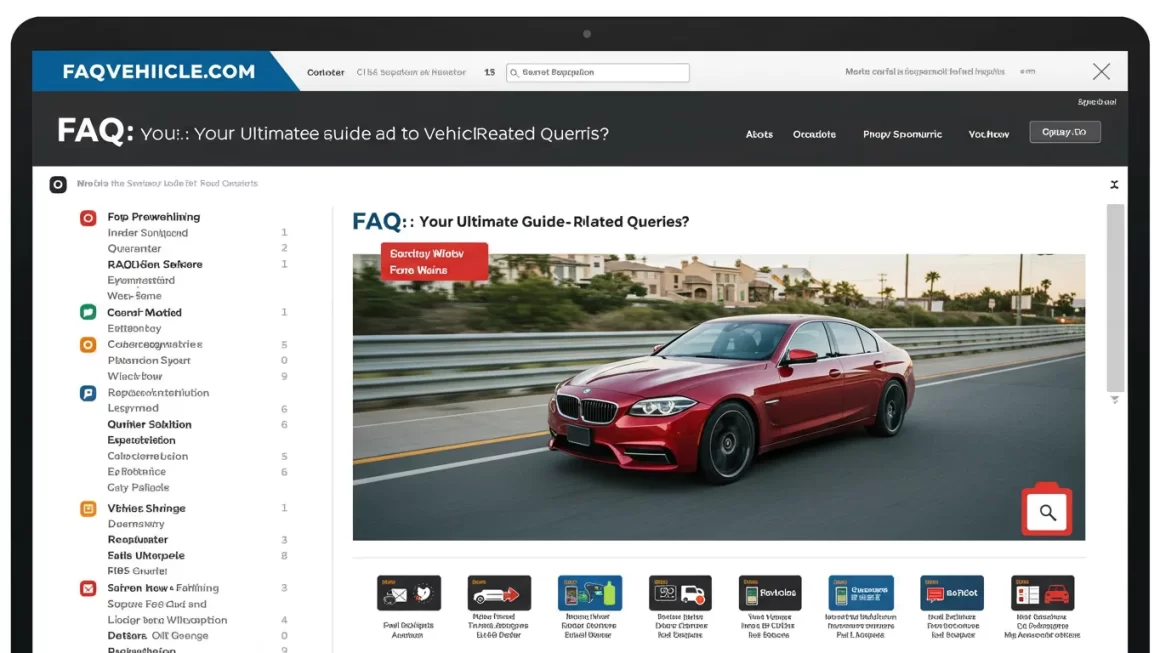In today’s fast-paced world, vehicle ownership and management come with a myriad of questions—from registration and taxation to inspections and environmental concerns. faqvehicle.com FAQ serves as a comprehensive resource designed to address common and critical questions related to vehicles.
Whether you are a new car owner, a seasoned driver, or someone interested in green vehicle technologies, understanding the frequently asked questions can save time, reduce confusion, and help you make informed decisions.
This article explores the key aspects covered by faqvehicle.com FAQ, providing clarity on vehicle inspections, taxation, green vehicles, and electric vehicle incentives.
Vehicle Inspections and Certifications
One of the primary concerns for vehicle owners is the inspection and certification process to ensure roadworthiness and compliance with local regulations.
The Vehicle Inspection and Certification System (VICS), for example, is a structured approach adopted in regions like Punjab to maintain vehicle safety and environmental standards.
For detailed guidance on this process, explore faqvehicle.com FAQ for Vehicle Info & Tips, which offers comprehensive information to help you stay compliant and informed.
- What is VICS?
VICS is a government-mandated system that requires vehicles to undergo periodic inspections at certified stations to verify their mechanical condition and emissions levels. This helps reduce accidents and pollution by ensuring vehicles meet safety and environmental criteria. - How to book an inspection?
Typically, vehicle owners can book appointments online or at designated centers. Required documents usually include vehicle registration papers and identification proof. The inspection covers brakes, lights, emissions, and overall vehicle integrity. - Who needs inspection?
Most commercial vehicles and private vehicles beyond a certain age are mandated to undergo inspection. New vehicles may be exempt initially but must comply after a specified period.
Understanding these procedures through faqvehicle.com FAQ helps vehicle owners stay compliant and avoid penalties.
Navigating Vehicle Taxation and Payment Channels
Vehicle taxation is another common area of inquiry. Governments impose motor vehicle taxes to fund road maintenance and infrastructure development.
- How to pay motor vehicle tax?
Various channels are available for tax payment, including online portals, ATM payments, over-the-counter options like Easy Paisa and Jazz Cash shops, and direct bank transfers. Having a Payment Slip Identification Number (PSID) facilitates smooth transactions. - What documents are required?
Usually, vehicle registration documents and tax payment receipts are necessary for verification during renewal or inspections.
faqvehicle.com FAQ often highlights these payment methods and requirements to simplify the process for vehicle owners.
Green Vehicles: The Future of Eco-Friendly Transportation
With increasing environmental concerns, many vehicle owners and prospective buyers are turning to green vehicles. faqvehicle.com FAQ provides insights into what constitutes a green vehicle and the types available.
- What is a green vehicle?
Green vehicles are those that use less fuel and emit fewer or no harmful emissions, thereby reducing environmental impact. They include fuel-efficient vehicles, hybrids, and electric vehicles (EVs). - Types of green vehicles:
- Fuel-efficient vehicles optimize fuel consumption to drive longer distances with less fuel.
- Hybrid vehicles combine internal combustion engines with electric motors, some requiring plug-in charging while others recharge through regenerative braking.
- Electric vehicles run solely on electric power and produce zero tailpipe emissions.
- How to identify an environmentally friendly car?
Vehicles are often ranked based on their CO2 emissions and fuel efficiency. The Green Vehicle Guide, for example, provides ratings and tips for greener driving practices.
Understanding these categories helps consumers make environmentally conscious choices aligned with their lifestyle and budget.
Also Read: www.quotela.net: Exploring a Multi-Faceted Content Hub for Readers and Marketers Alike
Electric Vehicles (EVs): Common Questions and Incentives
Electric vehicles are rapidly gaining popularity due to their environmental benefits and lower running costs. faqvehicle.com FAQ addresses common queries about EVs.
- What are the different EV types?
- Battery Electric Vehicles (BEVs) operate solely on battery power.
- Hybrid Electric Vehicles (HEVs) combine gasoline engines with electric motors but do not require plugging in.
- Plug-in Hybrid Electric Vehicles (PHEVs) can be charged externally and run on electric power for limited distances before switching to gasoline.
- Are EVs more expensive upfront?
While EVs may have a higher initial cost, they often incur lower maintenance and fuel expenses over time. For example, EV owners can save significantly on fuel and avoid routine oil changes. - Battery recycling and lifespan:
EV batteries typically last at least 10 years, after which recycling options exist to recover up to 90% of battery materials, reducing environmental impact. - Government incentives:
Various incentives, including tax credits and rebates, may be available depending on the region and vehicle model. It is advisable to consult local authorities or dealers for up-to-date information.
faqvehicle.com FAQ helps demystify these topics, encouraging more drivers to consider electric options.
Closing Words
faqvehicle.com FAQ is an invaluable tool for vehicle owners and prospective buyers seeking clear, reliable answers about vehicle inspections, taxation, green vehicles, and electric vehicle technologies.
By addressing common concerns such as inspection procedures, tax payment channels, environmental vehicle classifications, and EV incentives, it empowers users to navigate the complexities of vehicle ownership confidently.
Staying informed through such comprehensive FAQs not only ensures compliance with legal requirements but also promotes sustainable and cost-effective vehicle choices in a rapidly evolving automotive landscape.


